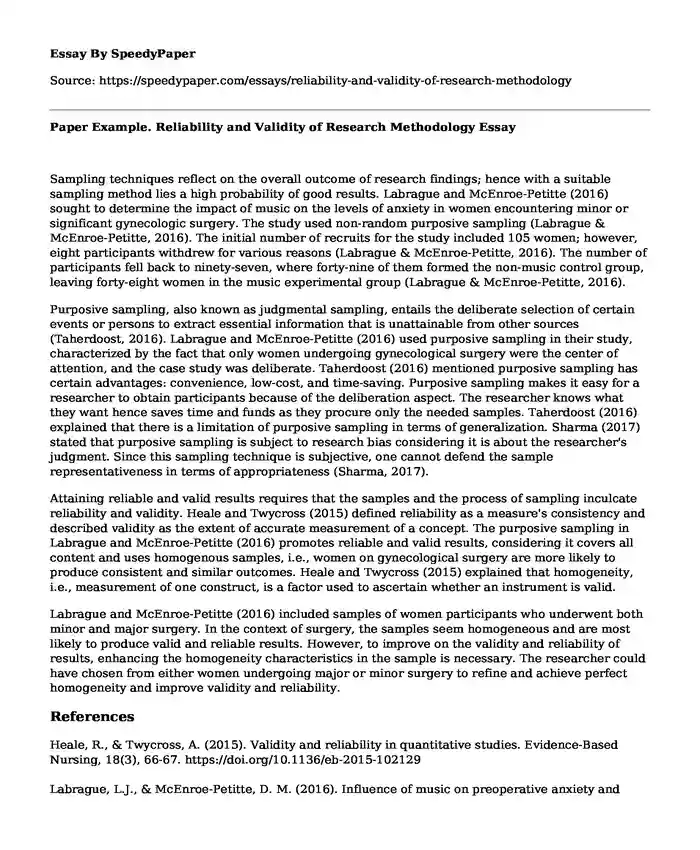
| Essay type: | Argumentative essays |
| Categories: | Women Music Research Medicine |
| Pages: | 2 |
| Wordcount: | 544 words |
Sampling techniques reflect on the overall outcome of research findings; hence with a suitable sampling method lies a high probability of good results. Labrague and McEnroe-Petitte (2016) sought to determine the impact of music on the levels of anxiety in women encountering minor or significant gynecologic surgery. The study used non-random purposive sampling (Labrague & McEnroe-Petitte, 2016). The initial number of recruits for the study included 105 women; however, eight participants withdrew for various reasons (Labrague & McEnroe-Petitte, 2016). The number of participants fell back to ninety-seven, where forty-nine of them formed the non-music control group, leaving forty-eight women in the music experimental group (Labrague & McEnroe-Petitte, 2016).
Purposive sampling, also known as judgmental sampling, entails the deliberate selection of certain events or persons to extract essential information that is unattainable from other sources (Taherdoost, 2016). Labrague and McEnroe-Petitte (2016) used purposive sampling in their study, characterized by the fact that only women undergoing gynecological surgery were the center of attention, and the case study was deliberate. Taherdoost (2016) mentioned purposive sampling has certain advantages: convenience, low-cost, and time-saving. Purposive sampling makes it easy for a researcher to obtain participants because of the deliberation aspect. The researcher knows what they want hence saves time and funds as they procure only the needed samples. Taherdoost (2016) explained that there is a limitation of purposive sampling in terms of generalization. Sharma (2017) stated that purposive sampling is subject to research bias considering it is about the researcher's judgment. Since this sampling technique is subjective, one cannot defend the sample representativeness in terms of appropriateness (Sharma, 2017).
Attaining reliable and valid results requires that the samples and the process of sampling inculcate reliability and validity. Heale and Twycross (2015) defined reliability as a measure's consistency and described validity as the extent of accurate measurement of a concept. The purposive sampling in Labrague and McEnroe-Petitte (2016) promotes reliable and valid results, considering it covers all content and uses homogenous samples, i.e., women on gynecological surgery are more likely to produce consistent and similar outcomes. Heale and Twycross (2015) explained that homogeneity, i.e., measurement of one construct, is a factor used to ascertain whether an instrument is valid.
Labrague and McEnroe-Petitte (2016) included samples of women participants who underwent both minor and major surgery. In the context of surgery, the samples seem homogeneous and are most likely to produce valid and reliable results. However, to improve on the validity and reliability of results, enhancing the homogeneity characteristics in the sample is necessary. The researcher could have chosen from either women undergoing major or minor surgery to refine and achieve perfect homogeneity and improve validity and reliability.
References
Heale, R., & Twycross, A. (2015). Validity and reliability in quantitative studies. Evidence-Based Nursing, 18(3), 66-67. https://doi.org/10.1136/eb-2015-102129
Labrague, L.J., & McEnroe-Petitte, D. M. (2016). Influence of music on preoperative anxiety and physiologic parameters in women undergoing gynecologic surgery. Clinical Nursing Research, 25(2), 157–173. https://doi.org/10.1177/1054773814544168
Sharma, G. (2017). Pros and cons of different sampling techniques. International journal of applied research, 3(7), 749-752. http://www.allresearchjournal.com/archives/2017/vol3issue7/PartK/3-7-69-542.pdf
Taherdoost, H. (2016). Sampling methods in research methodology; How to choose a sampling technique for research. International Journal of Academic Research in Management (IJARM), 5(2), 18-27. https://www.researchgate.net/publication/319998246_Sampling_Methods_in_Research_Methodology_How_to_Choose_a_Sampling_Technique_for_Research
Cite this page
Paper Example. Reliability and Validity of Research Methodology. (2023, Dec 14). Retrieved from https://speedypaper.net/essays/reliability-and-validity-of-research-methodology
Request Removal
If you are the original author of this essay and no longer wish to have it published on the SpeedyPaper website, please click below to request its removal:
- Organization Theory and Design - Free Essay
- Free Essay: Alice Munro's Novel Research
- Essay Example on Shirley Jackson's Story
- Paper Example. Kidney Trade Puzzle
- Free Essay Sample - Trump Bias
- Nurse Burnout - Essay Sample
- Free Essay on Shaping Personalities: A Comparative Analysis of Skinner and Rogers' Theories
Popular categories




